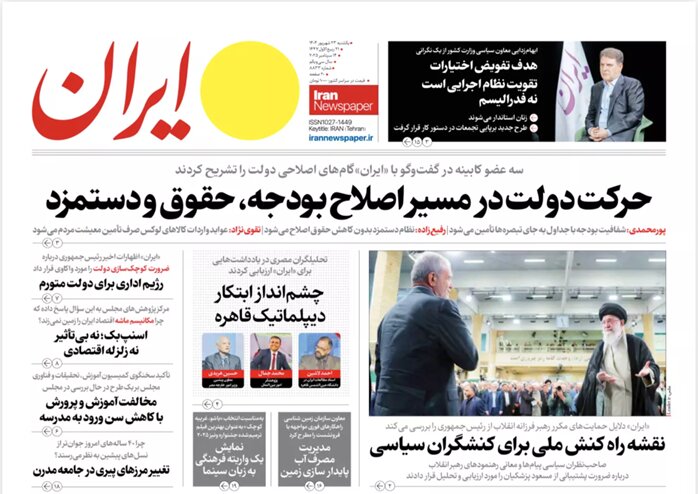The right diplomatic approach is an important step forward

TEHRAN - In a note, the Iran newspaper addressed technical diplomacy and the careful use of legal frameworks.
It wrote: The recent incident and the agreement between Tehran and the (International Atomic Energy) Agency to continue cooperation and resolve the remaining issues have shown once again that Iran, by using technical diplomacy and careful use of existing legal frameworks, can largely neutralize Israel's strategy to securitize the (Iran nuclear) case. While the Israeli regime was trying to create conditions for consensus-building against Iran by inciting the media environment, influencing the Agency's reports, and pressuring the members of the (IAEA) Board of Governors, Tehran, with a preemptive approach based on the logic of diplomacy, practically prevented the case from changing from technical to security. If Tehran can continue this path steadily and the Agency does not deviate from its technical role, the possibility of opening new paths to resolve disputes without the need for costly confrontation will increase. Ultimately, the Iran nuclear case is no longer just a technical issue, but a reflection of the power structure in the region and the world.
Shargh: Quitting NPT will be Iran’s response to return of snapback sanctions
Shargh devoted its editorial to Iran’s powerful tool against the activation of the snapback mechanism that would return the UN Security Council sanctions against Iran lifted under the JCPOA. It wrote: One assumption is that the Western parties know that using the snapback will prompt Iran to withdraw from the NPT. In such a case, their threats will be reduced, so they themselves are willing to delay it. Using snapback will not give them anything more than what they have achieved so far. Iran has shown that, despite avoiding conflict, it can cause serious damage to the Israeli economy. Europe and the United States have the tool to use the snapback. Instead, Iran has the tool to quit the NPT and not stay in the treaty for a moment. Therefore, Iran must be able to use this tool when its benefits outweigh its costs. Iran has declared that it does not want to produce an atomic bomb. This withdrawal is important if it wants to produce an atomic bomb. Therefore, in the face of the snapback stick the only tool that Iran has is the "threat of withdrawing from the NPT."
Vatan-e-Emrooz: An agreement with open eyes
Vatan-e-Emrooz, in an analysis, pointed to the important points in the recent agreement between Iran and the International Atomic Energy Agency, writing in light of the irresponsible behavior of the Agency in the joint U.S.-Zionist regime’s attacks on Iran’s nuclear facilities, the Agency’s access should be more limited than the time before the imposed 12-day war. Iran must have a practical response to the political and irresponsible behavior of the Agency, because it is in line with protecting national interests. After the June 12-day war, any type of cooperation with the Agency should be linked to a possible comprehensive agreement. Negotiations and agreement must definitely meet Iran’s demands, i.e., the lifting of sanctions. Any type of cooperation with the International Atomic Energy Agency should be conditional on deactivating the snapback mechanism. Accordingly, considering the nature of Europe’s behavior and policy against Iran, the framework of cooperation between Iran and the Agency should not go into effect under any circumstances before putting the snapback mechanism out of agenda.
Hamshahri: Iran’s warning to leaders of Islamic countries
The Hamshahri newspaper wrote Iran’s warning about the evil intentions of Israel must not be taken for granted by the Islamic and Muslim nations. It said: The Zionist regime’s terrorist attack on Qatar has been met with a wave of widespread condemnation from Arab and Islamic governments. However, this global bloc has so far failed to adopt effective strategies in the face of Tel Aviv’s continuous aggression. This failure comes at a time when, in recent years, and especially after the war on Gaza, Iranian officials have repeatedly warned at various levels about the Zionists’ sinister approaches and plans in the region, and have called for greater convergence among Arab and Islamic countries to confront this regime’s aggression in a coordinated and coherent manner. These warnings came before the recent terrorist attack by the Zionist regime on Qatar. The attack was another serious warning against the “dangerous passivity” of Arab and Islamic governments. Now, on the eve of an emergency summit of Islamic leaders, including the Organization of Islamic Cooperation and the Arab League, which is scheduled to be held in Doha on Monday, a re-examination of warnings by Iranian officials is necessary. The Muslim world must focus on Tel Aviv's provocative and dangerous behaviors before it is too late.
Leave a Comment